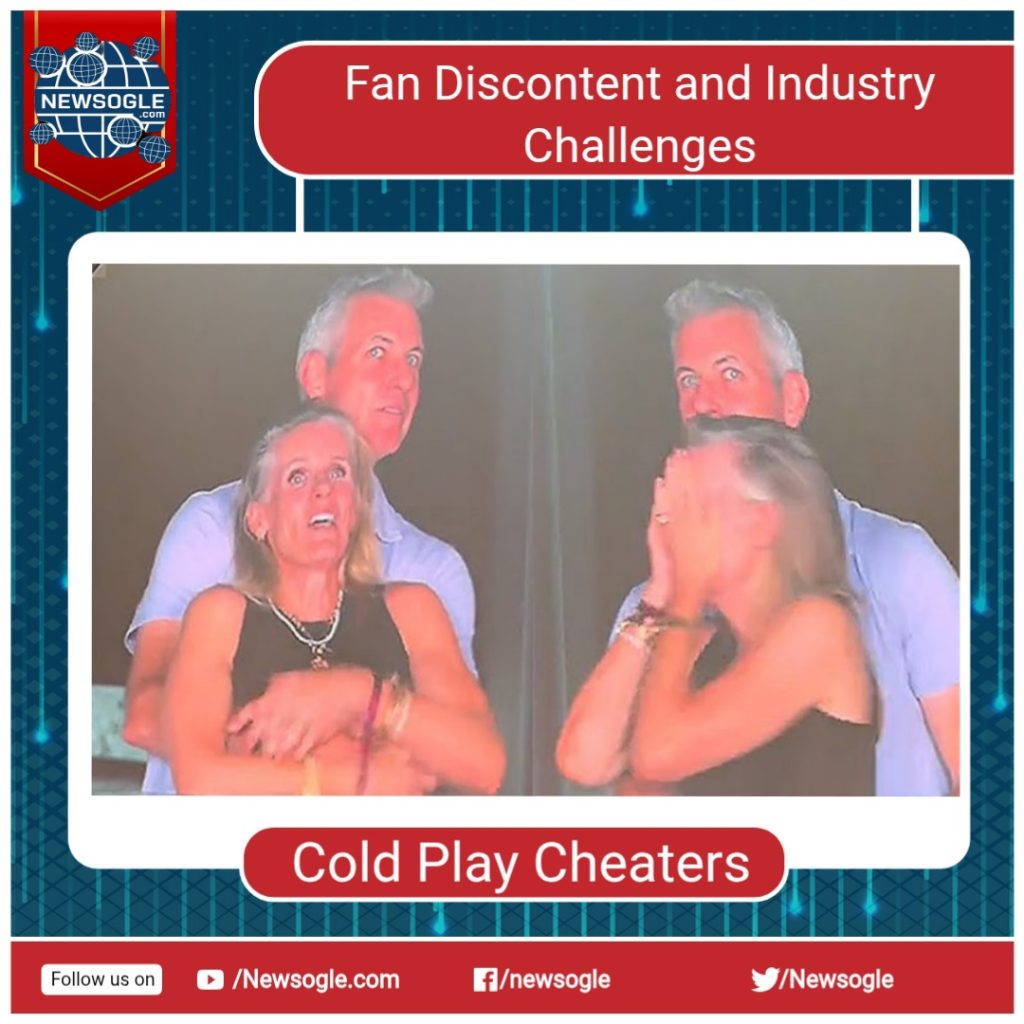
Keywords: Coldplay, Coldplay controversy, Coldplay tickets, Coldplay sustainability, Coldplay fan complaints, Coldplay greenwashing, Coldplay concert experience, music industry challenges, concert pricing, VIP packages, fan expectations, artist reputation, live music industry, dynamic pricing, Ticketmaster issues, environmental impact of touring.
Coldplay, one of the world’s most successful and beloved bands, has long been celebrated for their anthemic music, captivating live performances, and more recently, their ambitious commitment to environmental sustainability. With a career spanning over two decades, they have amassed a colossal global fanbase, selling out stadiums worldwide and consistently delivering blockbuster tours. However, beneath the glittering spectacle and humanitarian efforts, a growing undercurrent of discontent has given rise to a trending, albeit harsh, accusation: are Coldplay “cheaters”?
This term, often bandied about in online forums and social media, encapsulates a range of grievances from a segment of their fanbase. It touches upon issues of concert accessibility, the perceived value of their offerings, and the authenticity of their much-publicized eco-friendly initiatives. This post will delve deep into the various facets of this “cheaters” controversy, examining the specific complaints, the broader context of the modern music industry, and the implications for Coldplay’s enduring legacy.
The Ascent of Coldplay: From Indie Darlings to Global Superstars
Coldplay’s journey from a relatively humble indie rock band in the late 1990s to one of the biggest musical acts on the planet is a remarkable story of consistent artistic evolution and strategic global outreach. Their early albums, Parachutes and A Rush of Blood to the Head, established them as masters of melancholic yet uplifting anthems, resonating deeply with millions. As their sound evolved, incorporating more electronic and pop elements, their appeal broadened, leading to stadium-filling tours that became synonymous with grand, communal experiences.
Beyond their music, Coldplay cultivated an image of a conscientious band. Frontman Chris Martin often speaks about global issues, and the band has participated in numerous charity concerts and campaigns. More recently, they have taken a very public stance on environmentalism, pledging to make their tours as sustainable as possible. This public image of a band that cares, both about their music and the planet, makes the “cheater” accusations particularly jarring for many fans and observers. It creates a dissonance between the band’s stated values and the perceived reality of their commercial practices.
Unpacking the “Cheaters” Accusations: Areas of Fan Discontent
The “cheaters” label isn’t a single, unified complaint but rather a collection of grievances that, when combined, paint a picture of perceived exploitation or hypocrisy. These accusations primarily revolve around three major areas: concert accessibility and pricing, the value proposition of VIP packages, and the environmental sustainability of their massive global tours.
1. Exorbitant Ticket Pricing and Accessibility Barriers
Perhaps the most vocal and widespread complaint against Coldplay, and indeed many major artists today, centers on the cost of concert tickets. Fans frequently express outrage over the escalating prices, which often push a standard ticket into the hundreds of dollars, making live attendance an unaffordable luxury for many.
- Dynamic Pricing: A significant driver of this discontent is the implementation of “dynamic pricing” models, particularly through platforms like Ticketmaster. This system allows ticket prices to fluctuate in real-time based on demand, similar to airline fares. While proponents argue it helps capture more revenue for artists and combats scalping, fans often see it as pure price gouging. A ticket that might initially be listed at a reasonable price can skyrocket within minutes as demand surges, leaving many feeling exploited and frustrated. The emotional connection fans have with a band like Coldplay makes this perceived exploitation sting even more deeply. They feel their loyalty is being monetized unfairly.
- Secondary Market & Scalping: Despite dynamic pricing, the secondary market (resale sites) continues to thrive, with tickets often appearing at even higher markups. While not directly Coldplay’s fault, the sheer demand for their shows creates a fertile ground for scalpers, further exacerbating the accessibility issue. Fans often feel caught between paying exorbitant primary market prices or even higher secondary market prices, leading to a sense of being “cheated” out of a fair chance to see their favorite band.
- Exclusion of Core Fanbase: Many long-time fans, who have supported Coldplay since their early days, find themselves priced out of attending concerts. This creates a feeling of betrayal, as if the band has forgotten its roots and is now catering exclusively to a wealthier demographic. The emotional investment in a band’s journey makes this exclusion particularly painful, fueling the “cheater” narrative.
2. Disappointing VIP Packages and the Premium Experience
Beyond standard tickets, Coldplay, like many artists, offers a range of VIP packages promising enhanced experiences. These can include early entry, exclusive merchandise, premium seating, or access to pre-show lounges. However, complaints often surface that these packages fail to deliver on their lofty promises, leaving fans feeling shortchanged.
- Poor Value for Money: Fans report paying significantly inflated prices for VIP packages only to find that the “premium” seating offers a suboptimal view, the exclusive merchandise is of low quality, or the promised amenities are underwhelming. This creates a strong sense of being “cheated” out of the extra money spent.
- Lack of Exclusivity: Some VIP experiences are criticized for feeling overcrowded or lacking genuine exclusivity, undermining the very premise of a premium offering. If a “VIP lounge” is as crowded as a general admission area, the value proposition diminishes rapidly.
- Hidden Costs and Restrictions: Fans sometimes discover additional costs or unexpected restrictions associated with VIP packages, further eroding trust and contributing to a sense of being misled.
These issues highlight a broader problem in the live music industry where the push for higher revenue through tiered experiences can sometimes overshadow the actual delivery of value to the fan.
3. Sustainability Claims vs. Environmental Reality: The “Greenwashing” Accusation
Coldplay has been at the forefront of advocating for environmental sustainability in large-scale touring. Their “Music of the Spheres” tour, for instance, boasts ambitious goals like reducing carbon emissions by 50%, utilizing kinetic dancefloors and bikes to generate energy, and incorporating solar panels. While these efforts are commendable and innovative, they have also drawn criticism, leading to accusations of “greenwashing.”
- Scale of Global Touring: Critics argue that no matter how many green initiatives are implemented, the sheer carbon footprint of a global stadium tour – involving massive freight shipments, international flights for the band and crew, and millions of fans traveling to venues – is inherently unsustainable. The argument is that the band’s efforts, while positive, may only offset a small fraction of their overall environmental impact, making their claims feel disingenuous or exaggerated.
- Perception vs. Reality: The public perception created by Coldplay’s sustainability messaging is one of a truly “green” tour. However, the complex realities of logistics and energy consumption for such large-scale events mean that achieving true net-zero impact is incredibly challenging, if not impossible, with current technology. This gap between aspiration and current feasibility can lead to accusations that the band is using environmentalism as a marketing tool rather than achieving substantive change.
- Specific Technologies: While kinetic dancefloors and solar panels are innovative, their actual contribution to the overall energy needs of a stadium show might be relatively small compared to the power required for lighting, sound, and other infrastructure. This can lead to cynicism about the true impact of these highly publicized features.
These criticisms are not necessarily an attack on Coldplay’s intentions, but rather a scrutiny of whether their actions truly align with the bold environmental claims, leading some to feel “cheated” by what they perceive as an overly optimistic or even misleading narrative.
Fan Reactions and Media Scrutiny: The Digital Echo Chamber
The “Coldplay cheaters” narrative has largely gained traction through online platforms. Social media, fan forums, and music blogs serve as echo chambers where individual frustrations can quickly amplify into collective grievances.
- Social Media Outcry: Platforms like Twitter (X), Reddit, and Facebook are rife with posts from disgruntled fans sharing their experiences with high ticket prices, disappointing VIP packages, or skepticism about the band’s green claims. Hashtags and viral threads contribute to the rapid spread of these sentiments.
- Media Amplification: While some media outlets have reported on Coldplay’s sustainability efforts positively, others have picked up on the fan complaints, publishing articles that question ticket pricing or scrutinize the environmental impact of their tours. This media scrutiny, in turn, further fuels the online discussion.
- Generational Divide: There might be a generational divide in how these issues are perceived. Younger fans, who are often more financially constrained and digitally native, might be more vocal about accessibility issues and more skeptical of corporate “greenwashing.” Older fans, who have seen the industry evolve, might be more accepting of high prices as a new norm or more trusting of the band’s intentions.
Coldplay’s Response: Addressing the Elephant in the Room?
Coldplay and their management have, to some extent, addressed the issues of ticket pricing and sustainability.
- Ticket Pricing: Bands and promoters often attribute high ticket prices to rising touring costs, production expenses, and the desire to prevent scalping. While they haven’t explicitly apologized for high prices, the industry narrative generally points to market forces and the complexities of staging global shows.
- Sustainability Efforts: Coldplay has been very transparent about their sustainability initiatives, providing detailed reports and explanations on their website. They acknowledge the challenges of touring sustainably but emphasize their commitment to continuous improvement and innovation. They highlight their partnerships with environmental experts and their efforts to reduce emissions across all aspects of their tour. They frame their efforts as a journey, not a destination, acknowledging that perfection is elusive but progress is paramount.
However, for some fans, these explanations may not fully alleviate the feeling of being “cheated,” especially when faced with the immediate financial burden of attending a concert. The gap between the ideal and the practical reality remains a point of contention.
The Broader Context: Challenges in the Modern Music Industry
It’s important to view the “Coldplay cheaters” controversy not in isolation, but within the broader context of the challenges facing the modern music industry. Many of the complaints leveled against Coldplay are symptomatic of systemic issues that affect numerous major artists and their fans.
- Escalating Touring Costs: Staging a global stadium tour is an incredibly expensive undertaking. Production costs (sound, lighting, stage design), logistics (transporting equipment and personnel), venue rentals, security, and staff salaries have all risen significantly. These costs are inevitably passed on to the consumer.
- The Streaming Economy: While streaming has made music more accessible, it has also drastically reduced per-stream revenue for artists. This has shifted the primary income stream for many musicians from recorded music to live performances, putting immense pressure on ticket sales to generate sufficient revenue.
- Sustainability Dilemma for Global Acts: Achieving true environmental sustainability for a global touring act is a monumental challenge. While bands can implement various green technologies and practices, the fundamental act of international travel and large-scale energy consumption remains a significant hurdle. This creates a tension between a band’s environmental aspirations and the practicalities of their global reach.
- Fan Expectations vs. Economic Realities: Fans often have high expectations for concert experiences, driven by social media and the desire for memorable moments. However, these expectations clash with the economic realities of touring, leading to disappointment when the perceived value doesn’t match the high price tag.
- Role of Ticketing Platforms: Ticketing platforms like Ticketmaster, with their dominance and dynamic pricing models, often bear the brunt of fan anger. While they facilitate access to tickets, their practices are frequently seen as exploitative, contributing to the “cheaters” narrative.
The Future of Coldplay’s Reputation: Navigating Fan Sentiment
Can Coldplay effectively navigate these accusations and maintain their revered status? Their ability to do so will depend on several factors:
- Continued Transparency: Maintaining open communication about their financial and environmental practices can help build trust. Providing clear breakdowns of how ticket revenue is used and the actual impact of their sustainability efforts could be beneficial.
- Innovation in Fan Engagement: Exploring new ways to engage with fans that don’t solely rely on high-priced live events. This could include more accessible digital content, fan club benefits, or community initiatives.
- Addressing Accessibility: While challenging, finding ways to make concerts more accessible to a wider range of fans, perhaps through tiered pricing that includes more affordable options or lottery systems for loyal fans, could help mitigate some of the anger.
- Authenticity in Messaging: Ensuring that their public messaging, particularly on sustainability, is grounded in realistic achievements and acknowledges the ongoing challenges, rather than creating an impression of perfection.
Coldplay’s legacy is built on a foundation of emotional connection with their music and their grand live spectacles. The “cheaters” controversy, while perhaps not universally held, reflects a growing tension between the commercial realities of the music industry and the passionate expectations of a dedicated fanbase. How Coldplay addresses these concerns will not only shape their future but also provide a case study for how major artists can maintain integrity and connection in an increasingly complex and scrutinized world.
Conclusion: A Balancing Act in the Limelight
The “Coldplay cheaters” controversy highlights a complex interplay of factors: the escalating costs of live entertainment, the evolving dynamics of artist-fan relationships in the digital age, and the challenges of genuine sustainability in a globalized industry. While the term “cheaters” is a strong accusation, it often reflects a feeling of disappointment and disillusionment among fans who feel that the band’s commercial practices or environmental claims don’t align with their expectations or the band’s public persona.
Coldplay, like many artists of their stature, operates within an industry that demands massive financial outlay for global tours. Their efforts towards sustainability are pioneering, even if their ultimate impact is still a subject of debate. Ultimately, navigating this controversy requires a delicate balancing act: continuing to innovate artistically and environmentally, while also finding ways to address fan concerns about accessibility and value. The conversation around “Coldplay cheaters” serves as a powerful reminder that in the age of instant feedback and heightened scrutiny, maintaining a strong and authentic connection with the fanbase is paramount, even for the biggest bands in the world.




